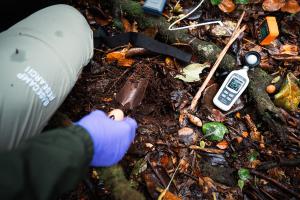Basecamp Research and Cameroon announce pioneering access & benefit-sharing deal, highlighting new model before COP 16
Access and benefit-sharing agreement showcases Basecamp Research’s unique economic model
The partnership is a model showing how industry can work with governments to equitably access digital sequence information (DSI) on genetic resources, such as the DNA sequences of plants, animals and microbes, by ensuring the communities protecting nature receive a share in revenues from products such as drugs, cosmetics and agricultural biotechnology.
● Training, data-sharing, molecular lab and in-country research funding for Cameroon scientists
● Royalties for when digital sequence information collected is used in commercial scientific research, or to train Artificial Intelligence models
● Cameroon is the first central African country to announce an access and benefit sharing deal for digital sequence information in run-up to UN Biodiversity Conference (COP 16) in Cali, Colombia from October 21-November 1 2024
Capacity-building in Cameroon is a key part of the agreement, under which Basecamp Research will train a local team to extract samples and process them for analysis. These skills will help them to better monitor, manage, and protect biodiversity in their communities.
As part of the partnership, four communities have initially agreed to allow sampling in their areas. Basecamp Research will pay royalties whenever its AI models use the Cameroonian DSI to design proteins for healthcare, or to make industrial practices more sustainable.
Basecamp Research will partner with AJESH, a non-profit organisation in Cameroon that has been investigating the role of biodiversity in conservation initiatives, natural resources management, climate change adaptation and achieving the UN Sustainable Development Goals.
The London-based biotech startup is attending talks in Montreal as a life sciences industry representative and will share its business model while nations meet for the final summit in the DSI intergovernmental negotiating group before the UN Biodiversity Conference (COP 16) in October in Cali, Colombia.
Ethical AI Innovation
Consent is essential for Basecamp Research, which since it was founded in 2019, has set out to prove it is possible to create cutting-edge AI while ethically sourcing 100% of its data. Not only has Basecamp Research built one of the largest biodiversity databases – bigger than any public data set – but every data point links to both the land owner’s consent and also a benefits-sharing agreement.
Pioneering Data Benefit-Sharing
Basecamp Research distributed its first wave of royalties this year to 37 communities and organisations in 13 countries, based on revenue generated as Basecamp Research’s clients tap into its uniquely diverse database. Projects included designing enzymes to biodegrade plastic, creating environmentally friendly clothes-dyeing processes, and helping pharmaceutical companies develop therapeutics. Basecamp Research anticipates royalties will only grow as its business scales.
Dr Aurélie Taylor Patience Dingom, PhD, who led the establishment of the ABS legal framework for Cameroon’s Ministry of Environment, Nature Protection and Sustainable Development, said: “Cameroon is proud to be a trailblazer with this partnership centred around the use of Digital Sequence Information (DSI). It recognises DSI as a crucial element in the development and the equitable sharing of financial benefits within the access and benefit-sharing framework. It was important that we involved the indigenous population and local communities in negotiating this benefit-sharing so it can improve their living conditions while also enhancing Cameroon’s contribution of biodiversity to development and human well-being.”
Bupe Mwambingu, Basecamp Research’s Biodiversity Partnerships Manager, said: “This partnership is the result of nearly two years of listening to, and working with, the Cameroonian government, NGOs and grassroots community members. It sets a new standard for promoting fair and ethical practices in the commercialisation of genetic resources. We hope that this is only the start, and we’ll see many similar partnerships across the continent soon.”
Harrison Nnoko, Executive President and CEO of AJESH, said: “This groundbreaking collaboration with Basecamp Research makes Cameroon the first nation in Central and West Africa to put into action access and benefit-sharing measures that connect local communities to commercial and scientific research activities. This initiative not only fosters equitable collaboration, but also helps preserve our rich biodiversity for future generations.”
D'Arcy Doran
Basecamp Research
press@basecamp-research.com
Visit us on social media:
X
LinkedIn
Legal Disclaimer:
EIN Presswire provides this news content "as is" without warranty of any kind. We do not accept any responsibility or liability for the accuracy, content, images, videos, licenses, completeness, legality, or reliability of the information contained in this article. If you have any complaints or copyright issues related to this article, kindly contact the author above.

